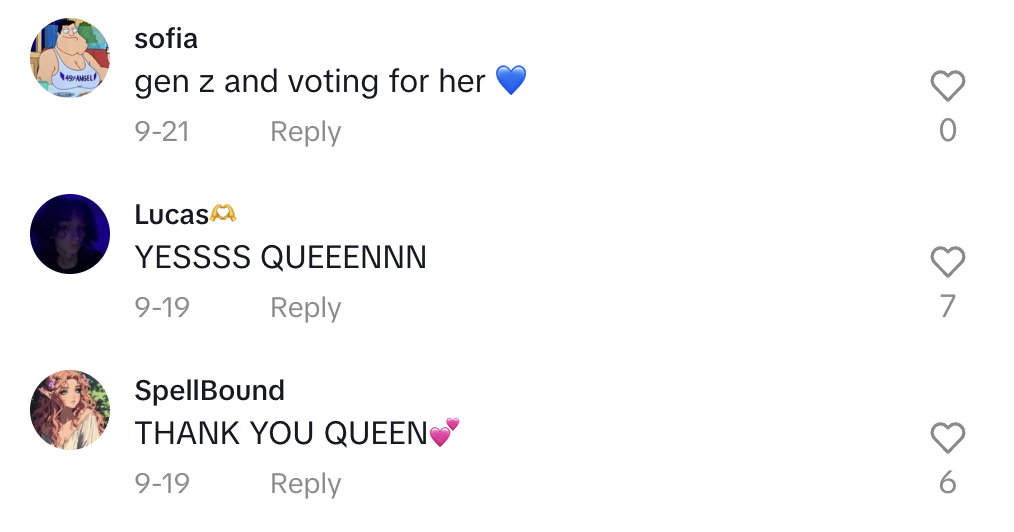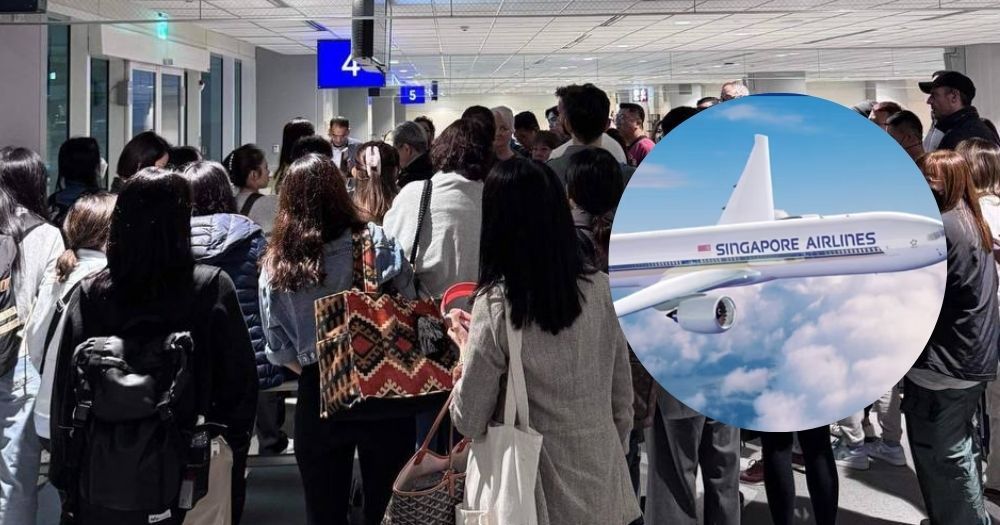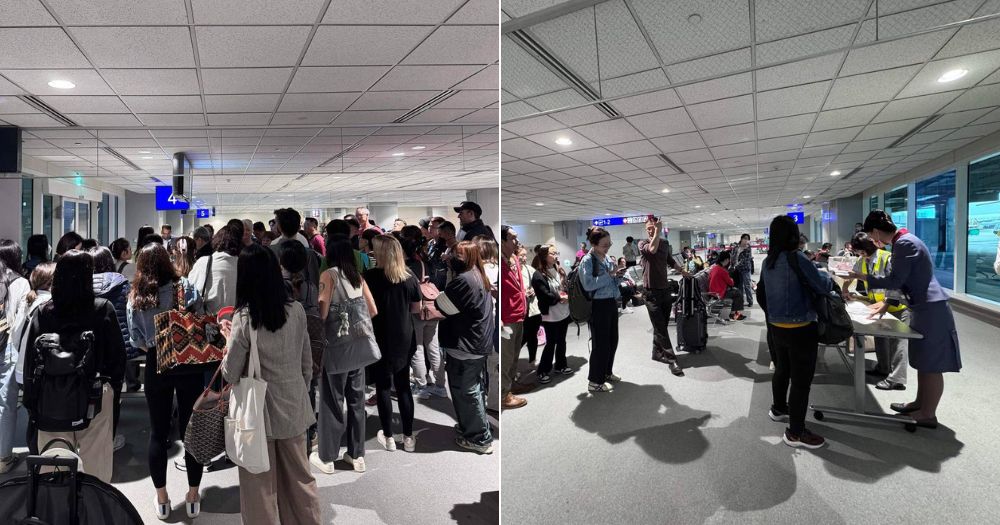Comment: Trump & Harris battle for young voters on TikTok while US ban looms
Both presidential candidates benefit from using TikTok in their campaigns, but it's not going to be an easy fight to keep the app in the country.

"You think you just fell out of a coconut tree?"
The rhetorical question, first raised by U.S. Vice President and Presidential candidate Kamala Harris at a White House ceremony in 2023, became a viral internet meme in 2024.
But in what seems to be an unprecedented political move, the 60-year-old Democratic Party's nominee for president is embracing the internet virality, even using it in her presidential campaign.
@kamalahqshe knows the memes 👀♬ Blow by Kesha Kamalas Version - En
The TikTok battle
Kamala HQ and humanising politician
Without any context, it could be easy to mistake Harris's campaign's social media page, Kamala HQ, for another internet meme page.
The TikTok account boasts 4.8 million followers on TikTok and posts meme-like content driven by Gen Z lingo.
The social media strategy appears to be working well for Harris, who is appealing to more than 170 million U.S. users who are on TikTok, many of whom are voters.
In taking the politician out of a formal setting, using a platform many young people use, and producing content using the language of the younger generation, Harris successfully breaks the unspoken invisible stereotype that political leaders are people out of reach.
 Image via @kamalahq/TikTok
Image via @kamalahq/TikTok
 Image via @kamalahq/TikTok
Image via @kamalahq/TikTok
Team Trump and breaking invisible barrier
Not to be outdone, Republican presidential candidate Donald Trump also launched a TikTok page for his campaign.
With 3.1 million followers, @teamtrump is also trying to break that invisible barrier between the politician and the people through its social media content.
Its most viral video, "President Trump works the Drive Thru at McDonald's", has been viewed some 63 million times.
@teamtrump “I could do this all day… I like this job.” 🤣 #fyp #trump2024 ♬ original sound - Team Trump
TikTok sell-or-ban bill
With TikTok playing a critical role in the political campaign to sway younger U.S. voters, it's almost easy to overlook the fact that its politicians are pushing to ban the social media app.
Trump previously attempted to ban TikTok in 2020, but was stopped by the U.S. courts.
The app faces scrutiny over potential national security issues, with FBI Director Chris Wray claiming that China could use the app to collect users' data which could be used for espionage operations.
TikTok is banned from government devices in various countries including the UK, the U.S., and New Zealand.
On Apr. 24, 2024, United States (U.S.) President Joe Biden signed the TikTok sell-or-ban bill into law, after an overwhelming bipartisan vote.
Despite increasing political polarisation in the U.S., one area where Democrats and Republicans can still agree is taking a tough stance on China.
Amidst concerns that the Beijing-based ByteDance, the parent company of TikTok, would not protect U.S. user data if the Chinese government leans on it, the framing of the issue became one of national security.
TikTok itself has its headquarters in Singapore and Los Angeles.
U.S. politicians did not appear convinced by TikTok's Singaporean CEO Chew Shou Zi's efforts to persuade them that the company would protect U.S. user data, even if Chew became a viral star thanks to TikTok videos.
This means that by Jan. 19, 2025, after the U.S. presidential election in November, ByteDance has had nine months to sell the social media platform or face a nationwide ban of the app in the U.S..
To fight the ban in courts: Chew Shou Zi
On Apr. 25, 2024, ByteDance issued a statement on Toutiao, a Chinese news and information content platform owned by ByteDance, that it has no plans to sell TikTok.
Moments after Biden signed the TikTok sell-or-ban bill into law, TikTok's Singaporean chief executive officer Chew Shou Zi said that he and his team intend to fight the ban in courts.
"The facts and the Constitution are on our side," Chew said.
"TikTok gives everyday Americans a powerful way to be seen and heard, and that's why so many people have made TikTok part of their daily lives."
Various sources told Reuters that in the event that TikTok has exhausted all its legal options to fight the U.S. ban, ByteDance would rather exit the U.S. than sell and have its prized algorithm and valuable data fall into American hands.
It is also unlikely to consider the option of separating its algorithms from TikTok's U.S. assets as it would be an extremely complicated procedure.
Not intending to ban TikTok: Trump & Harris
With time a-ticking, however, both Harris and Trump have come forward to say that they don't plan to ban TikTok.
Harris, who joined TikTok three months after the sell-or-ban bill was signed, told ABC News in a March interview that the Biden-Harris administration doesn't plan to ban TikTok.
"We do not intend to ban TikTok... We need to deal with the owner and we have national security concerns about the owner of TikTok, but we have no intention to ban TikTok," Harris said.
But with Biden signing the sell-or-ban bill just one month after the ABC interview, it is difficult to see a way forward for the app.
Trump, in an exclusive Bloomberg Business interview in July, said he no longer plans to ban the popular social media app and is "gonna save TikTok".
“Now [that] I’m thinking about it, I’m for TikTok, because you need competition,” Trump said.
“If you don’t have TikTok, you have Facebook and Instagram—and that’s, you know, that’s Zuckerberg.”
Not an easy fight
It's hard to see Harris and Trump pushing TikTok to the side, with both presidential candidates directly benefitting from using the app for their presidential campaigns.
But it's not going to be an easy fight to keep the app in the country.
On Sep. 16, 2024, TikTok went before the federal appeals court in an attempt to block the sell-or-ban bill, claiming that it would violate the U.S. users' right to free speech.
TikTok and the U.S. Justice Department have asked the court to make a ruling by Dec. 6, which would give time for an appeal before the Jan. 19 deadline for a ban or sale.
In the case of an appeal, the case would likely go to the Supreme Court, with three of its members having been appointed under the Trump Administration.
Top image via Kamala Harris/Facebook, Donald J. Trump/Facebook, Olivier Bergeron/Unsplash, and Canva
MORE STORIES





















